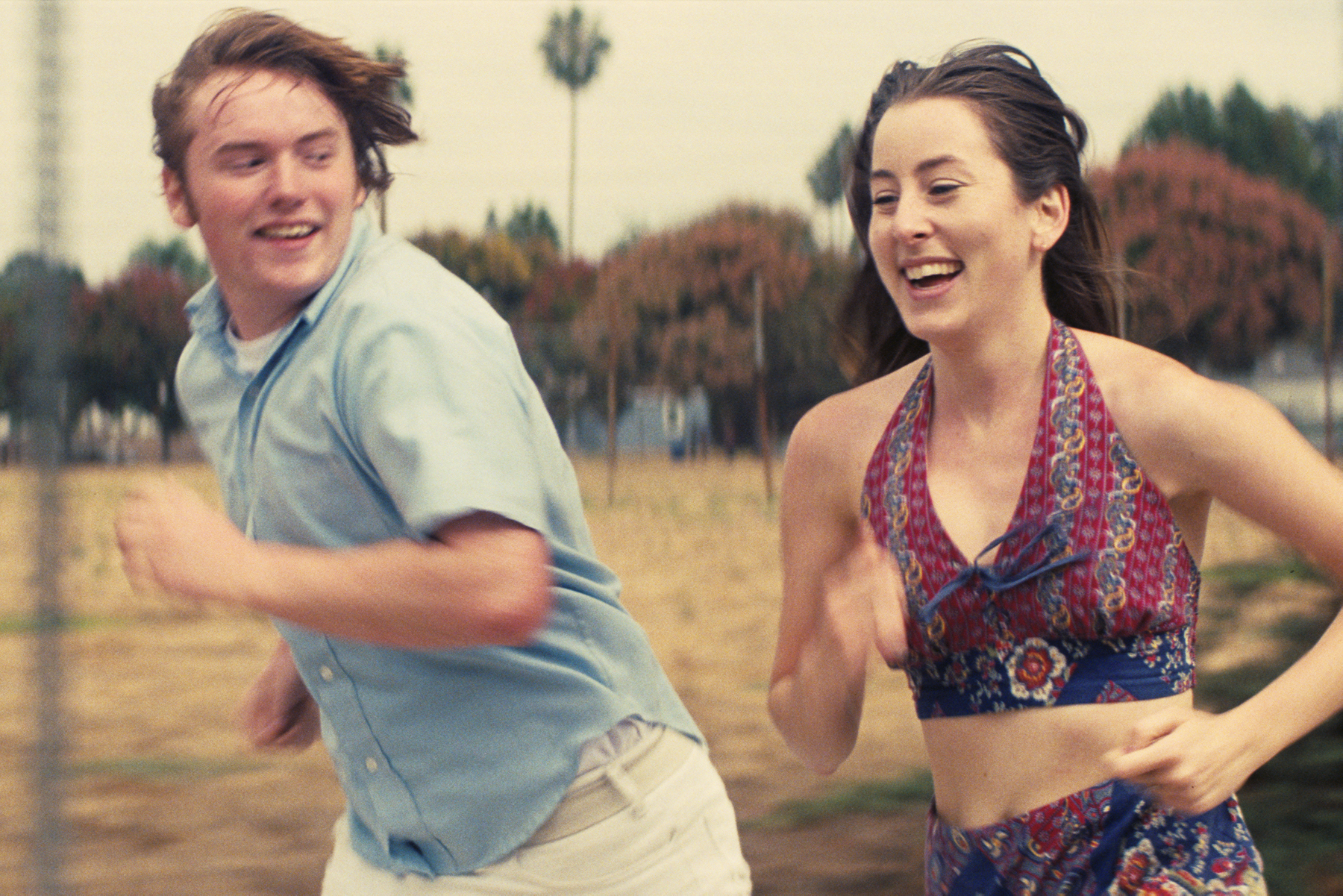
Licorice Pizza was a record store. You aren’t going to learn that watching Paul Thomas Anderson’s latest film with the same name. The store doesn’t appear in the film at all. If you knew about the record store already, it’s probably because you grew up in Southern California in the 1970s when the record store chain existed and when PTA’s film is set. Knowing Licorice Pizza is a record store though is advantageous to slipping into the groove of this movie. It’s like a trip to a record store. Licorice Pizza is a great hangout movie, awash in music—throughout, needles drop like sunshine from the Southern California sky—and shining with all the adolescent feelings pop music so perfectly captures.
There are probably lots of other things about Licorice Pizza that you only recognize if you grew up in the San Fernando Valley in the 1970s like the kids in the movie are doing. The film has such a strong sense of place. It is profoundly nostalgic. In nostalgia we only have lingering sense of “the way things felt when.” The way things felt warps and morphs our memory of places and events until they become something they factually were not but which are truer, in a way, to how we experienced them. We don’t understand many facets of who we are and what we do in the present moment. We just live. Only afterwards, with years of accumulated wisdom on our side, can we accurately see ourselves in the past, or at least the aspects of ourselves that mattered in the long run. But then, from the present, so much of the past is inaccessible to us. We have only our memories that held onto us, saturated by the years to accentuate what was emotionally remarkable in those moments.
Oh yeah! The plot! It barely matters, like the plot of a pop song, more of whiff of story than anything else. Gary loves Alana. Alana isn’t sure how she feels about Gary, but she certainly likes the attention. Gary is fifteen, so he loves with abandon. Alana is twenty-something, so she’s unsure about most things, but she’s sure that she needs to be certain about more things. Their age difference ensures the romance remains chaste. It never goes beyond the ardor of mutual interest. It’s the sweeping romance of a three minute song. Will it last? Can it last? Should it last? It lasts forever while the music plays.
The casting here is as important as the music and the place. Alana is played by Alana Haim, one third of the sister pop group Haim, for whom PTA has directed a few music videos. Her sisters play her sisters, and her parents play her parents. Haim and the Haims have a look and a sound that feels straight out of 1975. Alana, the character, is negotiating her identity amidst the swirl of 1970s expectations on young women. She’s pulled by feminist and misogynist and political and movie industry stereotyping forces. Gary’s infatuation with her is like a magnetic North leading her through the storm reminding her she has worth regardless of whatever labeled identity she accepts. Maybe. I’m honestly not one hundred percent sure why she likes Gary’s attention. I don’t think she is either. It seems to help her though. Alan is a rich, complicated character. PTA has always excelled at writing complicated characters. It’s been invigorating to see him turn to writing women better in his last two films.
Gary is played by Cooper Hoffman, son of the late Philip Seymour Hoffman, an actor who was essential to PTA’s work before Hoffman’s tragic death in 2014. He has his father’s innate openness, that inherent genuineness that makes you want to trust him. He uses that engendered trust to catapult into a variety of schemes to sell you something. Whatever he’s selling—Gary sells pinball machines or waterbeds; characters played by Philip Seymour Hoffman in past PTA films sold religion and mattresses—he’s also selling himself, asking his mark to love and respect him. It’s endearing, a little pathetic, and an accurate observation about how love works under late capitalism, a theme which has always been at the core of PTA’s films.
Because these are kids, they are still on the cusp of their lives, so hope and possibility beats stronger in their story than it could in PTA’s films about older romantics on the fade-out side of life. Gary and Alana aren’t getting a second chance. They’re reveling in their first blush of love. I’m in the middle of my life’s playlist, and it is intoxicating to return to those feelings of first love for a couple of hours with Paul Thomas Anderson and these kids, to rediscover that groove. Lift the needle. Play that one again. The only problem with pop songs is that they always end too soon.
Licorice Pizza was a record store. You aren’t going to learn that watching Paul Thomas Anderson’s latest film with the same name. The store doesn’t appear in the film at all. If you knew about the record store already, it’s probably because you grew up in Southern California in the 1970s when the record store chain existed and when PTA’s film is set. Knowing Licorice Pizza is a record store though is advantageous to slipping into the groove of this movie. It’s like a trip to a record store. Licorice Pizza is a great hangout movie, awash in music—throughout, needles drop like sunshine from the Southern California sky—and shining with all the adolescent feelings pop music so perfectly captures.
There are probably lots of other things about Licorice Pizza that you only recognize if you grew up in the San Fernando Valley in the 1970s like the kids in the movie are doing. The film has such a strong sense of place. It is profoundly nostalgic. In nostalgia we only have lingering sense of “the way things felt when.” The way things felt warps and morphs our memory of places and events until they become something they factually were not but which are truer, in a way, to how we experienced them. We don’t understand many facets of who we are and what we do in the present moment. We just live. Only afterwards, with years of accumulated wisdom on our side, can we accurately see ourselves in the past, or at least the aspects of ourselves that mattered in the long run. But then, from the present, so much of the past is inaccessible to us. We have only our memories that held onto us, saturated by the years to accentuate what was emotionally remarkable in those moments.
Oh yeah! The plot! It barely matters, like the plot of a pop song, more of whiff of story than anything else. Gary loves Alana. Alana isn’t sure how she feels about Gary, but she certainly likes the attention. Gary is fifteen, so he loves with abandon. Alana is twenty-something, so she’s unsure about most things, but she’s sure that she needs to be certain about more things. Their age difference ensures the romance remains chaste. It never goes beyond the ardor of mutual interest. It’s the sweeping romance of a three minute song. Will it last? Can it last? Should it last? It lasts forever while the music plays.
The casting here is as important as the music and the place. Alana is played by Alana Haim, one third of the sister pop group Haim, for whom PTA has directed a few music videos. Her sisters play her sisters, and her parents play her parents. Haim and the Haims have a look and a sound that feels straight out of 1975. Alana, the character, is negotiating her identity amidst the swirl of 1970s expectations on young women. She’s pulled by feminist and misogynist and political and movie industry stereotyping forces. Gary’s infatuation with her is like a magnetic North leading her through the storm reminding her she has worth regardless of whatever labeled identity she accepts. Maybe. I’m honestly not one hundred percent sure why she likes Gary’s attention. I don’t think she is either. It seems to help her though. Alan is a rich, complicated character. PTA has always excelled at writing complicated characters. It’s been invigorating to see him turn to writing women better in his last two films.
Gary is played by Cooper Hoffman, son of the late Philip Seymour Hoffman, an actor who was essential to PTA’s work before Hoffman’s tragic death in 2014. He has his father’s innate openness, that inherent genuineness that makes you want to trust him. He uses that engendered trust to catapult into a variety of schemes to sell you something. Whatever he’s selling—Gary sells pinball machines or waterbeds; characters played by Philip Seymour Hoffman in past PTA films sold religion and mattresses—he’s also selling himself, asking his mark to love and respect him. It’s endearing, a little pathetic, and an accurate observation about how love works under late capitalism, a theme which has always been at the core of PTA’s films.
Because these are kids, they are still on the cusp of their lives, so hope and possibility beats stronger in their story than it could in PTA’s films about older romantics on the fade-out side of life. Gary and Alana aren’t getting a second chance. They’re reveling in their first blush of love. I’m in the middle of my life’s playlist, and it is intoxicating to return to those feelings of first love for a couple of hours with Paul Thomas Anderson and these kids, to rediscover that groove. Lift the needle. Play that one again. The only problem with pop songs is that they always end too soon.

Elijah Davidson is Co-Director of Brehm Film and Senior Film Critic. Find more of his work at elijahdavidson.com.
In Spider-Man: No Way Home, Peter Parker is given the gift of layered experience due to a rift in the space-time continuum. It’s fun for fans who have watched all the Spider-Man movies made since 2001. It is enlightening for Peter.